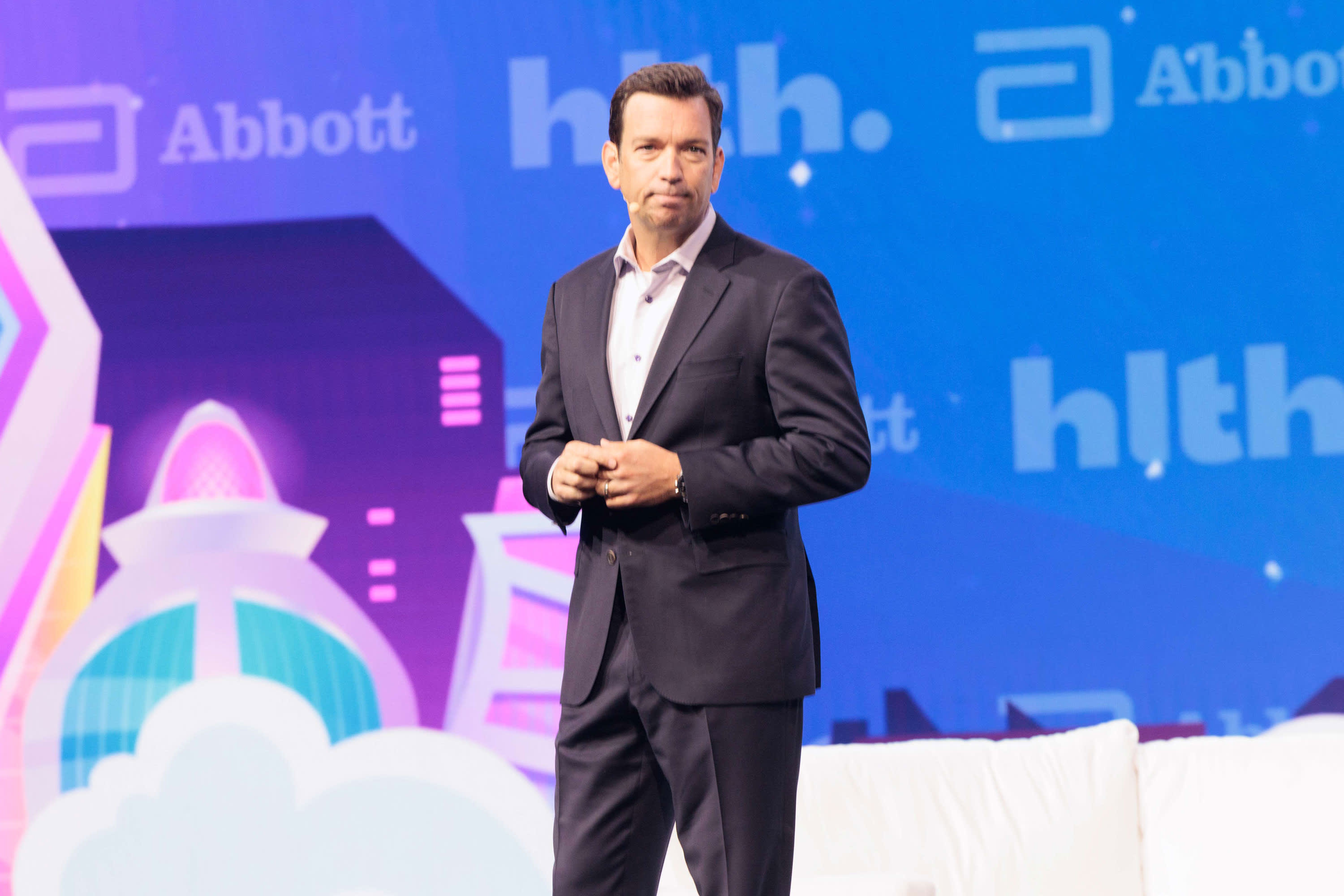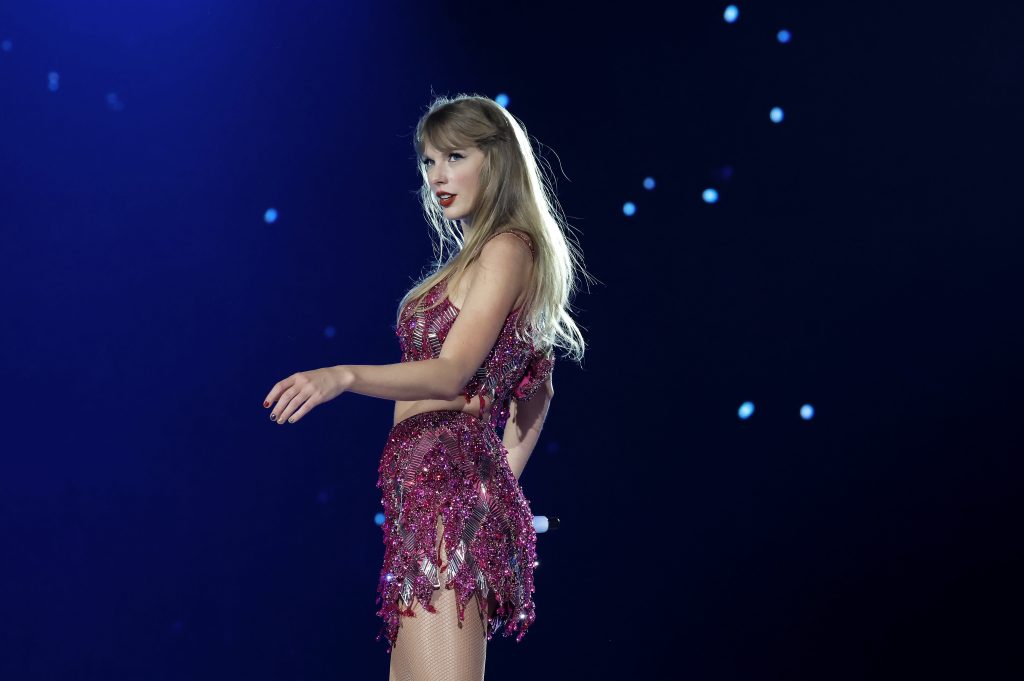
CEO Robert Ford speaking on stage at the HLTH conference in Las Vegas.
Source: Abbott
Abbott Laboratories CEO Robert Ford took the stage at the HLTH conference in Las Vegas on Tuesday to discuss the company’s expansion into a new market: consumer wearables.
The health-care company offers a range of products but derives the bulk of its revenue from medical devices and diagnostic tools. Its 15-minute rapid Covid test was a boon for the company, bringing in a staggering $7.7 billion in sales in 2021 and $8.4 billion the following year, a sizable portion of its total 2022 sales of $43.7 billion.
But as the pandemic has slowed so has testing. During its second quarter, Abbott reported $263 million in Covid test sales, a big drop from the $2.3 billion it reported during the year-earlier period.
Abbott knew Covid-testing rates would eventually decline, so Ford said he wanted to ensure the company continued investing in research and development for its other offerings, like its medical devices.
For instance, Abbott produces a continuous glucose monitor (CGM) called FreeStyle Libre that patients can use to manage their diabetes. The device is a small circular sensor that is applied to a patient’s upper arm, dispensing with the need for finger pricks that glucometers require. Abbott’s most recent model, the FreeStyle Libre 3, can measure glucose levels in real time for up to 14 days.
Margaret Kaczor Andrew, a partner and research analyst at William Blair, told CNBC’s Erin Black in May that Abbott has around two-thirds of the global CGM market. FreeStyle Libre alone generated more than $1.3 billion in sales for Abbott during its second quarter, according to the company’s earnings report.
The device has also attracted a surprising new demographic. Ford said people without diabetes have expressed interest in using FreeStyle Libre as a way to learn about how their bodies react to food and other daily activities.
This set the stage for Abbott to try and capture a new market for wearables.
“We always believed that we could take this platform that we developed for diabetes and expand it beyond diabetes,” Ford said.
“There’s a much larger population in the world that is actually healthy,” Ford added. “We’re going to continue to solve medical problems, but I think we also need to look at the healthy that want to stay healthy, and develop products and solutions and services for them.”
In January 2022, Abbott announced a new wearable sensor called Lingo that’s currently available in the U.K, and Ford said he hopes the device will come out in the U.S. next year. The device tracks glucose levels and pairs with an app where consumers can access a personalized coaching algorithm that offers recommendations around diet, sleep and exercise.
Abbott believes Lingo will help people better understand their metabolism, and ultimately make healthier decisions.
CEO Robert Ford speaking on stage at the HLTH conference in Las Vegas.
Source: Abbott
Since Lingo was first announced, Ford said, Abbott has been thinking about how to present the data to consumers in a way that is both simple and actionable. He said he wants people to be able to take advantage of the latest technology without feeling intimidated or that they need a medical degree to get the most out of it.
But for a company that’s spent the last 135 years working closely with doctors, researchers and other health-care experts, simple messaging can be a challenge.
“How do we get out of our own way?” Ford said. “Can you imagine your grandmother understanding that or your uncle understanding that? No, you don’t. So we have to change our way of how we talk.”
Ford added that since the company is exploring a new market, there will be kinks to work out. He said Abbott will have to evaluate the efficacy of its marketing, whether it can keep consumers engaged and whether it is targeting the right audience, among other things.
Ford is well acquainted with the challenges around ease of use.
Before serving as CEO, Ford worked as chief operating officer and as executive vice president of medical devices at Abbott. In 2008, he helped launch the company’s first CGM called FreeStyle Navigator, which was expensive, bulky and hard for patients to use. FreeStyle Navigator was discontinued, and Ford was sent back to the drawing board.
He said the experience forced him to learn to better communicate with consumers, which has helped inform his approach at Abbott going forward.
This time around, Ford said he wants consumers to know that Abbott understands the unique technological moment that the health-care industry is in — that it’s now easier than ever for people to access data about their own health.
“We get that there’s a revolution ongoing right now between health care and tech, and whether it’s AI, whether it’s connectivity, whether it’s the action of different hardware devices, whether it’s phones, tablets, glasses, etc., we get that, we can see that.” he said.
Abbott is planning to submit its Lingo filing to the Food and Drug Administration by the end of this year.

